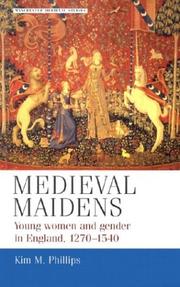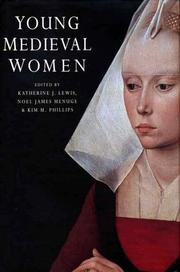| Listing 1 - 10 of 10 |
Sort by
|
Book
ISBN: 0812245482 1322513007 0812208943 9780812245486 Year: 2014 Publisher: Philadelphia : University of Pennsylvania Press,
Abstract | Keywords | Export | Availability | Bookmark
 Loading...
Loading...Choose an application
- Reference Manager
- EndNote
- RefWorks (Direct export to RefWorks)
A distinct European perspective on Asia emerged in the late Middle Ages. Early reports of a homogeneous "India" of marvels and monsters gave way to accounts written by medieval travelers that indulged readers' curiosity about far-flung landscapes and cultures without exhibiting the attitudes evident in the later writings of aspiring imperialists. Mining the accounts of more than twenty Europeans who made---or claimed to have made---journeys to Mongolia, China, India, Sri Lanka, and Southeast Asia between the mid-thirteenth and early sixteenth centuries, Kim Phillips reconstructs a medieval European vision of Asia that was by turns critical, neutral, and admiring. In offering a cultural history of the encounter between medieval Latin Christians and the distant East, Before Orientalism reveals how Europeans' prevailing preoccupations with food and eating habits, gender roles, sexualities, civility, and the foreign body helped shape their perceptions of Asian peoples and societies. Phillips gives particular attention to the texts' known or likely audiences, the cultural settings within which they found a foothold, and the broader impact of their descriptions, while also considering the motivations of their writers. She reveals in rich detail responses from European travelers that ranged from pragmatism to wonder. Fear of military might, admiration for high standards of civic life and court culture, and even delight in foreign magnificence rarely assumed the kind of secular Eurocentric superiority that would later characterize Orientalism. Placing medieval writing on the East in the context of an emergent "Europe" whose explorers sought to learn more than to rule, Before Orientalism complicates our understanding of medieval attitudes toward the foreign.
Ecrits de voyageurs européens --- Foreign public opinion, Western --- Opinion publique occidentale --- Public opinion, Western. --- Travelers' writings, European. --- Asiaten. --- Reiseliteratur. --- Ecrits de voyageurs européens --- Englisch. --- Travel, Medieval --- Travel, Medieval. --- Travel. --- Travelers' writings, European --- History --- Sources. --- History and criticism. --- Asia --- Asia. --- Europa. --- Description and travel --- Early works to 1800. --- History. --- Voyage --- Histoire --- Histoire et critique --- Asie --- Descriptions et voyages --- Ouvrages avant 1800 --- European travelers' writings --- European literature --- Civilization, Medieval --- Asian and Pacific Council countries --- Eastern Hemisphere --- Eurasia --- Cultural Studies. --- Literature. --- Medieval and Renaissance Studies.

ISBN: 071905964X 0719059631 9780719059636 9780719059643 Year: 2003 Publisher: Manchester Manchester University Press
Abstract | Keywords | Export | Availability | Bookmark
 Loading...
Loading...Choose an application
- Reference Manager
- EndNote
- RefWorks (Direct export to RefWorks)
Women --- History --- Middle Ages, 500-1500 --- Social status --- England --- Sex role --- Social history --- Young women --- Young adults --- Girls --- Social standing --- Socio-economic status --- Socioeconomic status --- Standing, Social --- Status, Social --- Power (Social sciences) --- Prestige --- Gender role --- Sex (Psychology) --- Sex differences (Psychology) --- Social role --- Gender expression --- Sexism --- Gender roles --- Gendered role --- Gendered roles --- Role, Gender --- Role, Gendered --- Role, Sex --- Roles, Gender --- Roles, Gendered --- Roles, Sex --- Sex roles
Book
ISBN: 9781350009684 1350009687 9780857850980 0857850989 Year: 2016 Publisher: London Bloomsbury Academic, an imprint of Bloomsbury Publishing Plc
Abstract | Keywords | Export | Availability | Bookmark
 Loading...
Loading...Choose an application
- Reference Manager
- EndNote
- RefWorks (Direct export to RefWorks)
History of civilization --- History of Europe --- anno 1000-1099 --- anno 1200-1499 --- anno 1100-1199 --- 396 --- 930.85 --- 930.85 Cultuurgeschiedenis. Kultuurgeschiedenis --- Cultuurgeschiedenis. Kultuurgeschiedenis --- 396 Feminisme. Vrouwenbeweging. Vrouw en maatschappij --- Feminisme. Vrouwenbeweging. Vrouw en maatschappij --- 396 Feminism. Women's movement. Woman and society --- Feminism. Women's movement. Woman and society
Periodical
Abstract | Keywords | Export | Availability | Bookmark
 Loading...
Loading...Choose an application
- Reference Manager
- EndNote
- RefWorks (Direct export to RefWorks)
Digital
ISBN: 9781350048164 9780857850980 Year: 2015 Publisher: London Bloomsbury Publishing
Abstract | Keywords | Export | Availability | Bookmark
 Loading...
Loading...Choose an application
- Reference Manager
- EndNote
- RefWorks (Direct export to RefWorks)
Book
ISBN: 9780812208948 Year: 2013 Publisher: Philadelphia
Abstract | Keywords | Export | Availability | Bookmark
 Loading...
Loading...Choose an application
- Reference Manager
- EndNote
- RefWorks (Direct export to RefWorks)
Multi
ISBN: 9780812208948 9780812245486 Year: 2013 Publisher: Philadelphia, Pa University of Pennsylvania Press
Abstract | Keywords | Export | Availability | Bookmark
 Loading...
Loading...Choose an application
- Reference Manager
- EndNote
- RefWorks (Direct export to RefWorks)
Book
ISBN: 9780745625225 9780745625232 0745625231 0745625223 Year: 2011 Publisher: Cambridge Polity
Abstract | Keywords | Export | Availability | Bookmark
 Loading...
Loading...Choose an application
- Reference Manager
- EndNote
- RefWorks (Direct export to RefWorks)
Sexuality in modern western culture is central to identity but the tendency to define by sexuality does not apply to the premodern past. Before the 'invention' of sexuality, erotic acts and desires were comprehended as species of sin, expressions of idealised love, courtship, and marriage, or components of intimacies between men or women, not as outworkings of an innermost self. With a focus on c. 1100–c. 1800, this book explores the shifting meanings, languages, and practices of western sex. It is the first study to combine the medieval and early modern to rethink this time of sex before sexuality, where same-sex and opposite-sex desire and eroticism bore but faint traces of what moderns came to call heterosexuality, homosexuality, lesbianism, and pornography.This volume aims to contribute to contemporary historical theory through paying attention to the particularity of premodern sexual cultures. Phillips and Reay argue that students of premodern sex will be blocked in their understanding if they use terms and concepts applicable to sexuality since the late nineteenth century, and modern commentators will never know their subject without a deeper comprehension of sex's history.
History of civilization --- Sexology --- Sex customs --- Sex and history. --- Vie sexuelle --- Sexualité et histoire --- History. --- Histoire --- Sex --- Homosexuality --- Heterosexuality --- history. --- Sexualité et histoire --- History --- history
Book
ISBN: 9782503531328 2503531326 9782503537993 Year: 2009 Volume: 18 Publisher: Turnhout Brepols
Abstract | Keywords | Export | Availability | Bookmark
 Loading...
Loading...Choose an application
- Reference Manager
- EndNote
- RefWorks (Direct export to RefWorks)
"Pre-modern European history is replete with moments of encounter. At the end of arduous sea and land journeys, and en route, Europeans met people who challenged their assumptions and certainties about the world. Some sought riches, others allies; some looked for Christian converts and some aimed for conquest. Others experienced the forced cultural encounter of exile. Many travelled only in imagination, forming ideas which have become foundational to modern mentalities: race, ethnicity, nation, and the nature of humanity. The consequences were profound: both productive and destructive. At the beginning of the third millennium CE we occupy a world shaped by those centuries of travel and encounter. This collection examines key themes and moments in European cultural expansion. Unlike many studies it spans both the medieval and early modern periods, challenging the stereotype of the post-Columbus 'age of discovery'. There is room too for examining cross-cultural relationships within Europe and regions closely linked to it, to show that curiosity, conflict and transformation could result from such meetings as they did in more far-flung realms. Several essays deal with authors, events, and ideas which will be unfamiliar to most readers but which deserve greater attention in the history of encounter and exploration."--Publisher's description.
History of civilization --- anno 1500-1799 --- anno 800-1199 --- anno 1200-1499 --- Europe --- Intercultural communication --- Discoveries in geography --- Europeans --- Communication interculturelle --- Découvertes géographiques européennes --- Européens à l'étranger --- History. --- European --- Social aspects --- Attitudes --- History --- Histoire --- Aspect social --- Territorial expansion --- Expansion territoriale --- Foreign countries --- Cross-cultural communication --- Communication --- Culture --- Cross-cultural orientation --- Cultural competence --- Multilingual communication --- Technical assistance --- Anthropological aspects --- Council of Europe countries --- Eastern Hemisphere --- Eurasia --- Social aspects. --- Découvertes géographiques européennes --- Européens --- À l'étranger

ISBN: 0312221304 Year: 1999 Publisher: St Martin's Press,
Abstract | Keywords | Export | Availability | Bookmark
 Loading...
Loading...Choose an application
- Reference Manager
- EndNote
- RefWorks (Direct export to RefWorks)
WOMEN --- HISTORY --- MIDDLE AGES, 500-1500
| Listing 1 - 10 of 10 |
Sort by
|

 Search
Search Feedback
Feedback About UniCat
About UniCat  Help
Help News
News